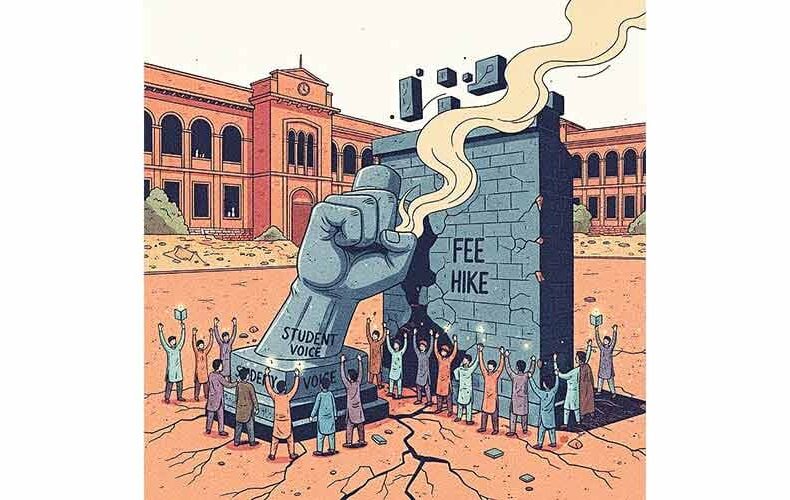
Institutional conflict
The Quiet Menace on Punjab University Campus: Fee Hike Sparks Unrest
The usual hustle and bustle of the University of the Punjab (PU) campus has been replaced by an unsettling quietness, a menacing reminder of the ongoing conflict between students and the university administration over the recent fee hike.
On September 24, the administration adopted a hardline stance against the protesting students. This disciplinary action, which included fines and probation, has ignited a heated debate about who is responsible for the campus unrest.
### Disciplinary Measures Enforced
Dr. Khurram Shehzad, the official spokesperson for PU, confirmed that 37 students are facing disciplinary action for violating university regulations. Of these, 21 students were fined Rs 20,000 each for their alleged involvement in agitation and violence, while 15 others were placed on a three-month probation. Additionally, the result of one student was withheld, and another was banned from entering the campus altogether.
According to Dr. Shehzad, the goal behind these penalties is to restore order on campus and encourage students to behave responsibly through a combination of discipline and counselling.
### Student Groups Voice Concerns
One of the most active student groups at PU, Islami Jamiat Talaba (IJT), perceives these actions as an attempt to suppress their voices. They claim the administration is targeting them for protesting against what they call an indiscriminate increase in tuition and hostel fees. IJT argues that the university is prioritizing revenue generation over the needs of students from middle-class backgrounds.
Highlighting the financial strain, an MPhil student from the Department of Development Communication shared that hostel fees have doubled from Rs 24,000 in 2024 to Rs 48,000 in 2025. Tuition fees have also seen a significant increase, he added.
### Administration’s Justification
Defending the fee hike, Dr. Shehzad explained, “Back in 2000, a student enrolling in an MSc programme had to pay just Rs 1,200 per year. This amount remained unchanged for a long time, but it was simply unsustainable. Since there was no adjustment for many years, the recent fee hike feels sharp.”
He further elaborated on the university’s financial pressures, noting that a major source of revenue from private students taking BA and BSc exams was eliminated due to a policy change. At the same time, government funding for higher education has been slashed, shrinking from approximately Rs 100 billion in 2017 to about Rs 60 billion today.
Dr. Shehzad also pointed out that the university hostels are operating at a loss by offering accommodation at a fraction of the market rate—a model that cannot sustain in the long term.
### Controversies Around Hostel Accommodations
The IJT contends that the administration’s actions target their group specifically for speaking out against the fee increases. Dr. Shehzad mentioned a recent drive to remove illegal occupants from university land, successfully reclaiming land worth billions of rupees and converting some boys’ hostels into facilities for female students.
Mehr Zain, the IJT nazim for the Old Campus, told *The News on Sunday* that while IJT initially supported the drive, the administration later refused to provide rooms to legitimate occupants, including out-of-town students enrolled in evening programmes. He believes the university’s record revenue is evidence of a profit-driven motive.
### Beyond Fees: Allegations of Suppression
The dispute extends beyond financial issues with accusations of excessive policing and suppression of free expression on campus.
Fasih-ur Rehman, the IJT spokesperson, claimed that the university frequently permits police presence to intervene even in neutral student events. He cited an incident where students were questioned for participating in a peaceful Defend Pakistan rally.
The two sides also offer conflicting accounts of a recent Students Rights March. The IJT alleges that their peaceful march was blocked by armed security guards, resulting in a scuffle. Conversely, the administration claims the IJT’s true motive is to reinstate about 100 expelled activists.
### Allegations of Illegal Activities
The administration accuses IJT members of engaging in illegal activities such as renting out hostel rooms and receiving free services. Officials allege that the group’s recent agitation is retaliation after losing these privileges.
### The Impact on Students
As this near-deadlock continues, regular students at PU find themselves caught in the middle, navigating an environment fraught with uncertainty and tension. The ongoing conflict between student protesters and university authorities leaves the future of campus peace and normalcy uncertain.
—
The situation at Punjab University underscores the challenges faced by higher education institutions balancing financial sustainability and student welfare. As both sides hold firm, the hope remains for a resolution that respects the rights and needs of all stakeholders involved.
https://www.thenews.com.pk/tns/detail/1346832-institutional-conflict
You may also like
延伸阅读
You may be interested
Delhi University Tightens Security At North Campus Ahead Of 2025 DUSU Vote Counting Amid Allegations Of Intimidation
New Delhi: Security has been tightened at Delhi University's North...
5 myths about scientists you learned from ‘Big Bang Theory’
By Vinita Jain | Sep 19, 2025, 02:29 PM **What’s...
2026 City Journal Award
For more details, please email [email protected]. --- ### Past Events...
 The New York Times
The New York Times
- Department of Homeland Security Shuts Down, Though Essential Work Continues 2026 年 2 月 14 日 Madeleine Ngo
- Casey Wasserman Will Sell Entertainment Agency Amid Epstein Files Fallout 2026 年 2 月 14 日 Shawn Hubler, Ben Sisario and Emmanuel Morgan
- New Research Absolves the Woman Blamed for a Dynasty’s Ruin 2026 年 2 月 14 日 Andrew Higgins
- How China Built a Chip Industry, and Why It’s Still Not Enough 2026 年 2 月 14 日 Meaghan Tobin
- ’The Interview’: Gisèle Pelicot Shares Her Story 2026 年 2 月 14 日 Lulu Garcia-Navarro
- Ramping Up Election Attacks, Trump Does Not Let Reality Get in His Way 2026 年 2 月 14 日 Katie Rogers
- Consultants Offered Epstein Access to Top N.Y. Democrats if He Donated 2026 年 2 月 14 日 Jay Root and Bianca Pallaro
- ICE Agents Menaced Minnesota Protesters at Their Homes, Filings Say 2026 年 2 月 14 日 Jonah E. Bromwich
- Trump Administration Tells Judge It Will Release Gateway Funding 2026 年 2 月 13 日 Patrick McGeehan
- Florida Couple Arrested After Pickleball Match Turns Into a Brawl 2026 年 2 月 13 日 Neil Vigdor



Leave a Reply